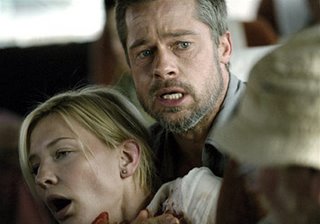Babel

According to Genesis, in the early days after creation, humankind decided to build a massive tower capable of reaching into the heavens. Angry at His creation's pride and arrogance, God confused their languages so that they could no longer understand one another. Unable to communicate, the work was halted and the builders scattered across the face of the earth, grouping according to their unique tongues. It is from this event that planet Earth's many races, cultures and languages sprang.
The characters in Babel are the spiritual children of that ill-fated construction project, doomed by their ancestors to a world in which language acts more as a means to distance and isolate us than aid in our understanding of one another.
No one in this film can communicate.
Not people and certainly not governments. Citizens of different countries are hindered by their own linguistic barriers. Even those who speak the same language cannot connect. Not husbands and wives. Not parents and children. Not siblings. There are even those who are literally, physically unable to communicate. No gender, no class, no country is immune.
Babel is threaded with several interlocking narratives that at first remind one of last year's Oscar-winning Crash but prove to have much more in common with the politically savvy Syriana.
Brad Pitt (his roles beginning to reflect his ideologies) and Cate Blanchett play a husband and wife who, while traveling through Morocco on what appears to be a last ditch effort to salvage their imploding marriage, fall prey to an errant bullet.
The bullet is fired from a gun in the hands of a young shepherd boy out to prove to his brother that their weapon could not possibly reach out and hit a tour bus on the ridge far below them. His error has tragic repercussions not just for his family but the entire community.
The Moroccan boys are not the only children in Babel. Pitt and Blanchett's children, in the care of their Mexican nanny (Adriana Barraza in the film's stand-out role), take an unscheduled trip across the border for Barraza's son's wedding. Getting into Mexico proves simple. Returning in the care of their undocumented nanny and her hot-headed nephew proves far more problematic, and ultimately, life-altering.
Finally, half a world away in Tokyo, a teenager (Rinko Kikuchi) struggles with the suicide of her mother, the emotional distance of her father (who plays an unexpected hand in the accidental shooting of Blanchett) and her own feelings of being unloved, all of which drive her to use sex as a means of communication and proof to herself and others that she's not some sort of monster. Choked with a massive population, Tokyo is not usually assumed to be a place of loneliness and isolation, but as a deaf/mute, Kikuchi is unable to physically connect with anyone.
While Babel is not a film interested in scaring the hell out of you or urging you to burn your passport, it does represent a world in which hope, compassion and level-headedness are commodities in short supply. It intentionally ends without resolving most, if not all of its story-lines. Because life is like that. Our problems do not vanish in the space of two hours or even two weeks. The repercussions of our actions and our responsibilities for those actions continue to ripple down through our lives, oftentimes for years.
Filmmaker Alejandro González Iñárritu (21 Grams) is interested in creating a unified picture that shows how the barriers of language and culture serve to divide us, but also reveal our most fundamental commonalities and connectedness. The smallest action in the smallest of countries can have a staggering ripple effect that can move like a hurricane-force gale through the halls of power of the largest and most powerful governments on the planet.
Iñárritu has made what is sure to be one of the most talked about and lauded films of the year.
Our world is one in which technology pervades all we do and are. Are we are capable of managing our creation? As 2001: A Space Odyssey asks, have we evolved to the point where our humanity will not be outstripped by the soullessness of our constructs? Are we doing little more than arrogantly building more towers to place ourselves on the same plane as God and if so, when will His wrath fall upon us?
The final shot of Babel is also the most memorable--a pull-back that starts on a balcony and glides backward across the glittering abyss of a city at night. A shot that, within the confines of the frame, easily encompasses hundreds of thousands, if not millions of people. Millions of people connected by a world getting smaller all the time. Millions of people ever more fragmented by the schisms of ideology, political oppositions and religious binaries. Millions of people never more in need of love, empathy and understanding.


1 Comments:
I still need to see this film. One thing I would note is that someone mentioned to AGI that his film has been compared to Crash in structure etc, which he kind of laughed at and then said that you could also say that Crash is similar to Amores Perros.
It'll be interesting to see especially since he considers this film the third of a trilogy.
Post a Comment
<< Home